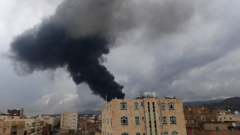A recent UN report highlights a severe famine in Gaza, attributing the crisis to deliberate restrictions imposed by Israeli policies. As aid trucks remain stranded at the borders, the situation continues to worsen, prompting international outrage and urgent calls for increased humanitarian assistance.
Escalating Famine in Gaza: A Man-Made Crisis

Escalating Famine in Gaza: A Man-Made Crisis
The human disaster in Gaza deepens, revealing systemic obstacles preventing food access amidst rising starvation rates.
Famine conditions are gripping Gaza, a dire situation exacerbated by policies that limit food access, as hundreds of aid trucks remain halted at the borders. According to the Integrated Food Security Phase Classification (IPC), a UN-supported hunger monitor, around 500,000 people, or 25% of Gaza's Palestinian population, are facing famine – a situation deemed "entirely man-made." Aid organizations accuse Israel of obstructing food supply, leading to disastrous conditions for civilians.
The IPC's assessment details the growing severity of the crisis, with evidence of starvation, widespread malnutrition among children, and an alarming mortality rate. Although the Gaza Health Ministry has reported malnutrition-related deaths totaling 273, including 112 children, Israeli Prime Minister Benjamin Netanyahu insists that no starvation is occurring, attributing any hunger to aid inefficiencies and Hamas.
Historical context shows that food access for Palestinians has been undermined long before the current conflict escalated in October 2023, following a deadly attack by Hamas. Since the onset of hostilities, Israel's blockade has tightened significantly, creating severe shortages. Under international pressure, Israel allowed limited goods into Gaza in late May, yet systemic restrictions remain.
Many Gazans have opted to risk their lives to obtain food aid at distribution sites run by the Gaza Humanitarian Foundation (GHF), which has replaced the previously established UN distribution system. Tragically, the UN has recorded numerous deaths linked to violence at these food distribution points, with claims of fatalities primarily attributed to Israeli troops, a narrative Israel contests.
Despite the recent allowance of more aid trucks into Gaza, humanitarian organizations underscore that the flow of assistance remains critically inadequate. Current demands reach 600 trucks per day for basic sustenance, yet actual numbers fall far short. Efforts to air-drop aid have been deemed unsafe and ineffective—merely a distraction from the core issue of access.
While Israel's stance blames Hamas for the ongoing hunger crisis, a range of findings, including a US government report, reveal no systematic diversion of aid by the militant group—much of the looting and desperation derives from the populace itself.
Israel's officials have dismissed the IPC report, labeling it biased and flawed, claiming it misrepresents data. Conversely, international bodies and leaders have condemned the situation, asserting Israel's obligations under international law to ensure the food security of the population in occupied territories. UN officials and various leaders have labeled the famine a direct consequence of Israel's obstruction of aid and characterized the starvation as a potential war crime.
In a troubling escalation, the Israeli government has authorized the mobilization of reservists for a potential offensive in Gaza City, the area most affected by famine. This military action is expected to forcibly displace millions of Palestinians and exacerbate the already dire humanitarian circumstances. Concern from UN agencies about the humanitarian impact of this invasion underscores the urgency for immediate and comprehensive aid to avert further loss of life in Gaza.

















